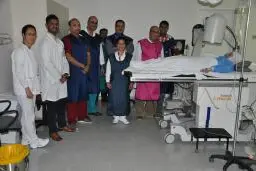PHOTO
New unit offers state-of-the-art non-invasive treatment for kidney stones
Sharjah-UAE, February 25, 2015
University Hospital in Sharjah (UHS), one of the largest hospitals in the country and the region, has launched a shock wave lithotripsy unit to treat kidney, bladder and ureter stones without surgical interference.
The unit was launched as part of the hospital's strategies to enhance services provided to patients in the local community, in line with the overall development plans undertaken by the UAE's and Sharjah's health sector.
Shock wave lithotripsy is currently undertaken by the University Hospital in Sharjah through the usage of state-of-the-art medical equipment, developed in France, that can be easily used without anaesthesia or operation room-related treatment. Depending on the size of the stone, the 45-minute session directs around 3500 shock waves in the locality of the stone to fragment it.
Professor Rajaie Mahran, Consultant Urologist, University Hospital in Sharjah (UHS), said: "We have committed ourselves to deliver this advanced, safe, and quickly effective procedure as part of our medical strategy for this year. This unit is supported by many other departments in the hospital, particularly the laboratory, radiology, and internal medicine. The only restrictions to patients are that they required to not drink water or eat for several hours before the procedure and must also not take any drugs that could interfere with the blood clotting mechanism in the days directly leading up to procedure. Treatment takes less than an hour, enabling the patient to go home on the same day."
"Kidney, urinary tract, bladder, or ureter stones are treated in several ways including fragmentation and lithotripsy that direct shock waves to the area of the stone from outside the body through Extracorporeal Shock Wave Lithotripsy Skin (ESWL). Kidney stones are removed from the body because they may cause microbial infections, bleeding, and/or blockage of kidney course or parts of the urinary tract," added Dr. Mahran.
An X-ray is re-taken a week after the operation to make sure that renal outflow blockade has ended and the body functions normally, he explained.
Already, the University Hospital in Sharjah has treated two medical cases in the new unit who needed stone fragmentation. A female patient in her thirties had a 1.2cm3 stone in her right renal pelvis and was treated with 3500 shock waves while the second patient, a male in his sixties, suffered from repeated stone infections and was subjected to 4500 shock waves to fragment a 1.8 cm3 stone. After-fragmentation results showed that both patients were healthy.
The Urology Department In Sharjah University Hospital had earlier recorded many medical successes including a rare surgery on a 95-year-old patient, whose prostate was removed surgically with the usage of the tissue vaporisation technique, leaving the patient in good health and allowing him to leave hospital in less than 24 hours. A similar technique was used with patients of different age groups who were also discharged from hospital on the same day.
-Ends-
For more information Please contact:
Majdi Ashour
Sahara Communications
E-mail: Majdi@saharagcc.com
Mobile: 0551014522
Nadia AlQassab
Sahara Communications
E- mail: nadia@saharagcc.com
Mobile: 050 3512183
© Press Release 2015




















